Discover The Take
The Take

The Take
Author: Al Jazeera
Subscribed: 295,909Played: 7,208,141Subscribe
Share
© 2026 Al Jazeera Media Network. All rights reserved.
Description
The Take is a daily interview-driven international news podcast hosted by award-winning journalist Malika Bilal. Each episode focuses on conversations with journalists and people directly impacted by the news of the day, offering our listeners the context necessary to understand what's in the headlines.
With millions of global listens, it's clear the conversations we're having on The Take are worth hearing. And critics think so too. The show has won the Online Journalism Awards, the Signal Awards, Lovie Awards, and Anthem Awards, among others.
1492 Episodes
Reverse
US President Donald Trump is threatening to annex Greenland, framing it as protection against China and Russia, but the autonomous Danish territory holds strategic Arctic value as climate change opens new shipping routes and mineral access. Its 57,000 Inuit residents are rejecting his threats as insulting and colonial. How do Greenlanders see their future amid this geopolitical storm? In this episode: Sara Olsvig, International Chair of the Inuit Circumpolar Council Episode credits: This episode was produced by Marcos Bartolome, Tamara Khandaker, and Melanie Marich, with Noor Wazwaz, Tuleen Barakat, and our guest host, Kevin Hirten. It was edited by Alexandra Locke. Our sound designer is Alex Roldan. Our video editors are Hisham Abu Salah and Mohannad al-Melhemm. Alexandra Locke is The Take’s executive producer. Ney Alvarez is Al Jazeera’s head of audio. Connect with us: @AJEPodcasts on X, Instagram, Facebook, and YouTube
Nobel Laureate Dr. Omar Yaghi joins The Take after winning the 2025 Nobel Prize in Chemistry for developing metal-organic frameworks (MOFs), materials that can capture carbon and store hydrogen. Born to a Palestinian refugee family in Amman, Yaghi tells the story of how hardship shaped his imagination, from getting fresh water only once a week to inventing systems that pull water from desert air. In this episode: Dr. Omar Yaghi, Nobel Laureate in Chemistry, Professor at University of California, Berkeley and Atoco Founder Episode credits: This episode was produced by Chloe K. Li and Melanie Marich with Phillip Lanos, Spencer Cline, Tamara Khandaker, Kylene Kiang, Sarí el-Khalili and our host, Malika Bilal. It was edited by Noor Wazwaz and Sarí el-Khalili. The Take production team is Marcos Bartolomé, Sonia Bhagat, Spencer Cline, Sarí el-Khalili, Tamara Khandaker, Kylene Kiang, Phillip Lanos, Chloe K. Li, Melanie Marich, and Noor Wazwaz. Our host is Malika Bilal. Our engagement producers are Adam Abou-Gad and Vienna Maglio. Andrew Greiner is lead of audience engagement. Our sound designer is Alex Roldan. Our video editors are Hisham Abu Salah and Mohannad al-Melhem. Alexandra Locke is The Take’s executive producer. Ney Alvarez is Al Jazeera’s head of audio. Connect with us: @AJEPodcasts on X, Instagram, Facebook, and YouTube
This week: 109 days into a ceasefire, Israel has killed at least 646 Palestinians in Gaza. The US announced phase 2 of the Gaza ceasefire deal. Israeli forces kill a young boy in the Occupied West Bank. Israel has killed more than 71,548 Palestinians in Gaza since October 7th, 2023. In this episode: Osama Bin Javid, (@osamabinjavaid), Al Jazeera Correspondent Michael Appel, (@TheMikeAppel), Al Jazeera Senior Producer Tareq Abu Azzoum, (@abuoazzum) Al Jazeera Correspondent Nida Ibrahim, (@nidaibrahim) Al Jazeera Correspondent Episode credits: This episode was voiced by Nida Ibrahim, and producer by Marthe van der Wolf. Our sound designer is Alex Roldan. Our lead of audience development and engagement is Andrew Greiner and Munera AlDosari is our engagement producer. Alexandra Locke is The Take’s executive producer. Ney Alvarez is Al Jazeera's head of audio. Connect with us: @AJEPodcasts on X, Instagram, Facebook, and YouTube
Every Saturday, we revisit a story from the archives. This originally aired on August 29, 2025. None of the dates, titles, or other references from that time have been changed. Unit 8200, Israel’s elite cyber-intelligence division, has long been compared to the US National Security Agency. Its veterans are now embedded in US tech companies, shaping how the world’s data is managed, and making deals worth billions. What does it mean for privacy and security? In this episode: Murtaza Hussain (@mazmhussain) Journalist, Drop Site News Episode credits: This episode was updated by Tamara Khandaker and Sarí el-Khalili. The original production team was Noor Wazwaz, Diana Ferrero, Sarí el-Khalili, Melanie Marich, Farhan Rafid, Kisaa Zehra, Amy Walters, and our guest host, Natasha Del Toro. Our sound designer is Alex Roldan. Our engagement producers are Adam Abou-Gad and Vienna Maglio. Andrew Greiner is lead of audience engagement. Alexandra Locke is The Take’s executive producer, and Ney Alvarez is Al Jazeera’s head of audio. Connect with us: @AJEPodcasts on X, Instagram, Facebook, and YouTube
Back in 2022, protests in Iran were bolder than at any time since the 1979 revolution — and that time, it was teenage girls leading the way. Gen Z used their TikTok and Instagram skills to draw the world’s attention to their demand for freedom. But with almost 300 hashtags under #MahsaAmini, their movement was also being co‑opted for others’ purposes. How could anyone tell which was which? This is a story from the archives. It originally aired on October 19, 2022. None of the dates, titles or other references from that time has been changed. In this episode: Holly Dagres (@HDagres), The Atlantic Council Nonresident Senior Fellow & MENASource and IranSource Editor Marc Owen Jones (@MarcOwenJones), Assistant Professor of Middle East Studies, Hamad bin Khalifa University Episode credits: This episode was produced by Amy Walters with Negin Owliaei, Chloe K. Li, Alexandra Locke, Ruby Zaman, Ashish Malhotra and our guest host, Halla Moheiddeen. Our sound designer is Alex Roldan. Tim St. Clair mixed this episode. Our video editors are Hisham Abu Salah and Mohannad Al-Melhem. Alexandra Locke is the Take’s executive producer. Ney Alvarez is Al Jazeera’s head of audio. Connect with us: @AJEPodcasts on X, Instagram, Facebook, and YouTube
US President Donald Trump says removing President Nicolas Maduro is about reclaiming Venezuela’s oil. But as Washington pushes for access, major oil companies are hesitating. Why is Venezuela being labeled “uninvestable,” and what does that skepticism reveal about power, instability and the future of Venezuela’s vast oil reserves? In this episode: Anneke Ball (@annekeball), Journalist Episode credits: This episode was produced by Marcos Bartolomé and Melanie Marich, with Tamara Khandaker, and our host, Kevin Hirten. It was edited by Ney Alvarez and Noor Wazwaz. Our sound designer is Alex Roldan. Our video editors are Hisham Abu Salah and Mohannad Al-Melhem. Alexandra Locke is the Take’s executive producer. Ney Alvarez is Al Jazeera’s head of audio. Connect with us: @AJEPodcasts on X, Instagram, Facebook, and YouTube
Iran’s protests started with economic demands. Now, the Iranian government says it’s ready for war. Meanwhile, US President Donald Trump has told Iranian protesters that “help is on the way,” as Washington discusses military options. Could tension spread far beyond Iran? In this episode: Negar Mortazavi (@NegarMortazavi), Center for International Policy Senior Fellow and Host of The Iran Podcast Episode credits: This episode was produced by Sarí el-Khalili, Chloe K. Li, and Melanie Marich with Phillip Lanos, Spencer Cline, Tamara Khandaker, Noor Wazwaz and our host, Malika Bilal. It was edited by Ney Alvarez. Our sound designer is Alex Roldan. Our video editors are Hisham Abu Salah and Mohannad al-Melhemm. Alexandra Locke is The Take’s executive producer. Ney Alvarez is Al Jazeera’s head of audio. Connect with us: @AJEPodcasts on X, Instagram, Facebook, and YouTube
A ceasefire in Aleppo has halted days of deadly fighting, after clashes between Syrian forces and Kurdish fighters. With civilians displaced and trust deeply shaken, questions are growing about whether Syria’s post-war transition can survive long term. In this episode: Bernard Smith (@JazeeraBernard), Correspondent, Al Jazeera Episode credits: This episode was produced by Noor Wazwaz and Melanie Marich, with Tamara Khandaker, David Enders and our guest host, Kevin Hirten. It was edited by Kylene Kiang and Ney Alvarez. Our sound designer is Alex Roldan. Our video editors are Hisham Abu Salah and Mohannad al-Melhemm. Alexandra Locke is The Take’s executive producer. Ney Alvarez is Al Jazeera’s head of audio. Connect with us: @AJEPodcasts on X, Instagram, Facebook, and YouTube
A deadly ICE operation in Minneapolis has sparked protests and political conflict. US officials say a federal immigration agent acted in self-defense, while local leaders, citing video evidence, reject that narrative and demand accountability. With investigations ongoing and trust fractured between federal and local authorities, what does this moment reveal about who controls oversight when federal force turns lethal? In this episode: Jon Collins (@JonSCollins), Senior Reporter, Minnesota Public Radio Episode credits: This episode was produced by Sarí el-Khalili and Chloe K. Li, with Phillip Lanos, Spencer Cline, Tamara Khandaker and our host, Malika Bilal. It was edited by Kylene Kiang. The Take production team is Marcos Bartolomé, Sonia Bhagat, Sarí el-Khalili, Spencer Cline, Tamara Khandaker, Kylene Kiang, Phillip Lanos, Chloe K. Li, Melanie Marich, and Noor Wazwaz. Our host is Malika Bilal. Our engagement producers are Adam Abou-Gad and Vienna Maglio. Andrew Greiner is lead of audience engagement. Our sound designer is Alex Roldan. Our video editors are Hisham Abu Salah and Mohannad al-Melhem. Alexandra Locke is The Take’s executive producer. Ney Alvarez is Al Jazeera’s head of audio. Connect with us: @AJEPodcasts on X, Instagram, Facebook, and YouTube
This week: 102 days into a cease fire, Israel has killed at least 439 Palestinians in Gaza. Weather continued to threaten the lives of displaced Palestinians in Gaza. Israel issued demolition orders for a playground in the occupied West Bank. Israel has killed more than 71,409 Palestinians in Gaza since October 7th, 2023. In this episode: Hind Khoudary, (@hindkhoudary) Al Jazeera Correspondent Tareq Abu Azzoum, (@abuoazzum) Al Jazeera Correspondent Resul Serdar, (@ResulSerdarAtas) Al Jazeera Correspondent Nida Ibrahim, (@nidaibrahim) Al Jazeera Correspondent Episode credits: This episode was produced and mixed by David Enders. Our sound designer is Alex Roldan. Our lead of audience development and engagement is Andrew Greiner and Munera AlDosari is our engagement producer. Alexandra Locke is The Take’s executive producer. Ney Alvarez is Al Jazeera's head of audio. Connect with us: @AJEPodcasts on X, Instagram, Facebook, and YouTube
Every Saturday, we revisit a story from the archives. This originally aired on July 7, 2025. None of the dates, titles, or other references from that time have been changed. When AI data centers come to town, companies promise jobs and opportunity. But what about all the water needed to keep data centers running? In one drought-stricken community in Brazil, residents must weigh the choices. How do communities balance the economic boost and environmental cost of hosting water-reliant data centers? In this episode: Laís Martins (@laismartins.com), Investigative Journalist Episode credits: This episode was updated by Tamara Khandaker. The original production team was Marcos Bartolomé, Haleema Shah, Remas Alhawari, Manny Panaretos, Mariana Navarrete, Kylene Kiang, and our guest host, Kevin Hirten. Our sound designer is Alex Roldan. Our engagement producers are Adam Abou-Gad and Vienna Maglio. Andrew Greiner is lead of audience engagement. Alexandra Locke is The Take’s executive producer, and Ney Alvarez is Al Jazeera’s head of audio. Connect with us: @AJEPodcasts on X, Instagram, Facebook, and YouTube
Iranians have taken to the streets in nationwide protests against the country's economic crisis. During a police crackdown on protesters, dozens of people have been killed and more have been arrested. US President Donald Trump has warned Iran that if the brutality continues, Iran would be “hit very hard by the United States.” Why is the US threatening intervention? In this episode: Narges Bajoghli (@nargesbajoghli), Associate Professor of Middle East Studies, Johns Hopkins University Episode credits: This episode was produced by Chloe K. Li and Melanie Marich, with Phillip Lanos, Spencer Cline, Tamara Khandaker, and our host, Malika Bilal. It was edited by Kylene Kiang. Our sound designer is Alex Roldan. Our video editors are Hisham Abu Salah and Mohannad al-Melhem. Alexandra Locke is The Take’s executive producer. Ney Alvarez is Al Jazeera’s head of audio. Connect with us: @AJEPodcasts on X, Instagram, Facebook, and YouTube
In the three months since the US unveiled a 20-point Gaza plan, more than 400 Palestinians have been killed and thousands injured in near-daily Israeli attacks. Gaza has been fragmented, with Israel controlling over half its territory. Is this "peace plan" truly about peace? In this episode: Mohammed Mhawish (@mohamhawish), Journalist and Writer Episode credits: This episode was produced by Chloe K. Li, Noor Wazwaz, and Tamara Khandaker, with Phillip Lanos, Spencer Cline, Fatima Shafiq, and our host, Kevin Hirten. It was edited by Kylene Kiang. Our sound designer is Alex Roldan. Our video editors are Hisham Abu Salah and Mohannad al-Melhem. Alexandra Locke is The Take’s executive producer. Ney Alvarez is Al Jazeera’s head of audio. Connect with us: @AJEPodcasts on X, Instagram, Facebook, and YouTube
Artificial intelligence is moving fast - from chatbots to autonomous systems and physical machines. As investment surges, so do concerns about job losses, surveillance, warfare and whether the boom can last. We take a look at where AI is headed in 2026 and the growing resistance against unchecked technological power. In this episode: Brian Merchant (@bcmerchant), Writer, Blood in the Machine Episode credits: This episode was produced by Tamara Khandaker and Chloe K. Li, with Phillip Lanos, Spencer Cline, Fatima Shafiq, and our host, Malika Bilal. It was edited by Noor Wazwaz. Our engagement producers are Adam Abou-Gad and Vienna Maglio. Andrew Greiner is lead of audience engagement. Our sound designer is Alex Roldan. Our video editors are Hisham Abu Salah and Mohannad al-Melhem. Alexandra Locke is The Take’s executive producer. Ney Alvarez is Al Jazeera’s head of audio. Connect with us: @AJEPodcasts on X, Instagram, Facebook, and YouTube
Israel has become the first country in the world to recognize the breakaway region of Somaliland since it declared independence in 1991. What does the move mean for regional tensions around the Red Sea and Gulf of Aden, and what will aligning with Israel mean for Somaliland? In this episode: Faisal Ali (@FaisalAHAli), Journalist, Al Jazeera English Episode credits: This episode was produced by Tracie Hunte, Sarí el-Khalili, and Melanie Marich, with Fatima Shafiq, Farhan Rafid, Tamara Khandaker, and our guest host Kevin Hirten. It was edited by Noor Wazwaz and Kylene Kiang. Our sound designer is Alex Roldan. Our video editors are Hisham Abu Salah and Mohannad Al-Melhem. Alexandra Locke is The Take’s executive producer. Ney Alvarez is Al Jazeera’s head of audio. Connect with us: @AJEPodcasts on X, Instagram, Facebook, and YouTube
What happens when the US says it will “run” a country? President Donald Trump says the US will take control of Venezuela after arresting President Nicolas Maduro. The move has few modern parallels and raises urgent questions about sovereignty, oil, and regional stability. Why now? In this episode: Lucia Newman, Al Jazeera’s Latin America editor Episode credits: This episode was produced by Noor Wazwaz and David Enders with Farhan Rafid and our host, Kevin Hirten. It was edited by Alexandra Locke. The Take production team is Marcos Bartolomé, Sonia Bhagat, Spencer Cline, Sarí el-Khalili, Diana Ferrero, Tracie Hunte, Tamara Khandaker, Kylene Kiang, Phillip Lanos, Chloe K. Li, Melanie Marich, Catherine Nouhan, and Noor Wazwaz. Our editorial interns are Farhan Rafid, and Kisaa Zehra. Our host is Malika Bilal. Our engagement producers are Adam Abou-Gad and Vienna Maglio. Andrew Greiner is lead of audience engagement. Our sound designer is Alex Roldan. Joe Plourde mixed this episode. Our video editors are Hisham Abu Salah and Mohannad al-Melhem. Alexandra Locke is The Take’s executive producer. Ney Alvarez is Al Jazeera’s head of audio. Connect with us: @AJEPodcasts on X, Instagram, Facebook, and YouTube
This week: 95 days into a ceasefire, Israel has killed at least 418 Palestinians in Gaza. Israel placed new restrictions on NGOs operating in Gaza. As a new year began, Palestinians in Gaza continued to put hopes in a fragile ceasefire. Israel has killed at least 71,384 Palestinians in Gaza since October 7th, 2023. In this episode: Hani Mahmoud, Al Jazeera Correspondent Tareq Abu Azzoum, (@abuoazzum) Al Jazeera Correspondent Sinem Koseoglu, (@sinemkoseoglu) Al Jazeera Correspondent Episode credits: This episode was produced and mixed by David Enders. Our sound designer is Alex Roldan. Our lead of audience development and engagement is Andrew Greiner and Munera AlDosari is our engagement producer. Alexandra Locke is The Take’s executive producer. Ney Alvarez is Al Jazeera's head of audio. Connect with us: @AJEPodcasts on X, Instagram, Facebook, and YouTube
Every Saturday, we revisit a story from the archives. This originally aired on August 19, 2025. None of the dates, titles, or other references from that time have been changed. With nearly 3 million Twitch followers, Hasan Piker is one of the internet’s biggest political streamers. He blends humor, culture and masculinity talk with sharp political commentary, drawing young men away from the US alt-right. And on Gaza, he has become one of the loudest US voices for Palestine. In this episode: Hasan Piker, @hasanthehun, online streamer Episode credits: This episode was updated by Tamara Khandaker. The original production team was Tracie Hunte, Sonia Bhagat Chloe K. Li, Phillip Lanos, Spencer Cline, Melanie Marich, Julia Muldavin, Kisaa Zehra, Farhan Rafid, Sarí el-Khalili, and our host, Malika Bilal. Our sound designer is Alex Roldan. Our engagement producers are Adam Abou-Gad and Vienna Maglio. Andrew Greiner is lead of audience engagement. Alexandra Locke is The Take’s executive producer, and Ney Alvarez is Al Jazeera’s head of audio. Connect with us: @AJEPodcasts on X, Instagram, Facebook, and YouTube
We’re looking back at 10 of the episodes that defined 2025 at The Take. This originally aired on November 19. None of the dates or references have been changed. Immigration and Customs Enforcement (ICE) is operating in an unprecedented way during US President Donald Trump’s second term. The agency has existed for over 20 years, but now operates as a masked force. Imposters posing as agents have committed crimes such as kidnapping and sexual assault. The FBI has urged ICE officers to unmask and identify themselves. How did the agency get here? In this episode: Hannah Allam (@HannahAllam), Reporter, ProPublica Episode credits: This episode was produced by Haleema Shah, Sarí el-Khalili and Diana Ferrero, with Melanie Marich, Farhan Rafid, Fatima Shafiq, Tamara Khandaker, and our guest host, Natasha Del Toro. It was edited by Noor Wazwaz and Kylene Kiang. Our sound designer is Alex Roldan. Our video editors are Hisham Abu Salah and Mohannad al-Melhem. Alexandra Locke is The Take’s executive producer. Ney Alvarez is Al Jazeera’s head of audio. Connect with us: @AJEPodcasts on X, Instagram, Facebook, and YouTube
We’re looking back at 10 of the episodes that defined 2025 at The Take. This originally aired on September 11. None of the dates or references have been changed. Shot while answering a question about mass shootings, outspoken gun-rights advocate and conservative activist Charlie Kirk was killed on a university campus. What does this moment signal for escalating political violence and the state of US politics? In this episode: Matthew Boedy (@MatthewBoedy), Professor of Rhetoric, University of North Georgia Episode credits: This episode was produced by Amy Walters, Sarí el-Khalili, Diana Ferrero and Tamara Khandaker, with Phillip Lanos, Spencer Cline, Melanie Marich, Chloe K. Li, Farhan Rafid, Kisaa Zehra, and our host, Malika Bilal. It was edited by Noor Wazwaz and Kylene Kiang. Special thanks to Negin Owliaei. Our sound designer is Alex Roldan. Our video editors are Hisham Abu Salah and Mohannad al-Melhem. Alexandra Locke is The Take’s executive producer. Ney Alvarez is Al Jazeera’s head of audio. Connect with us: @AJEPodcasts on X, Instagram, Facebook, and YouTube














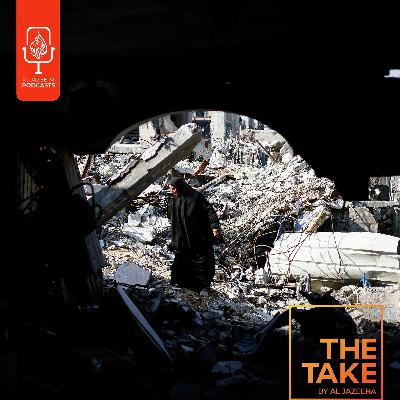

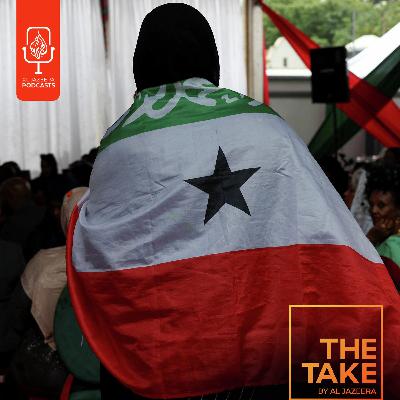
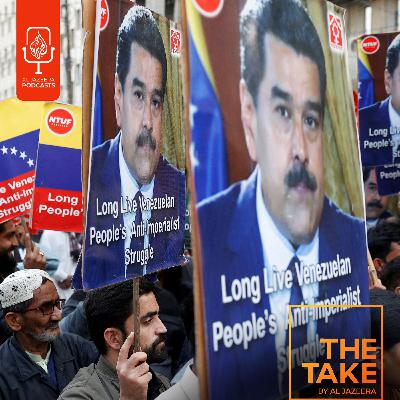
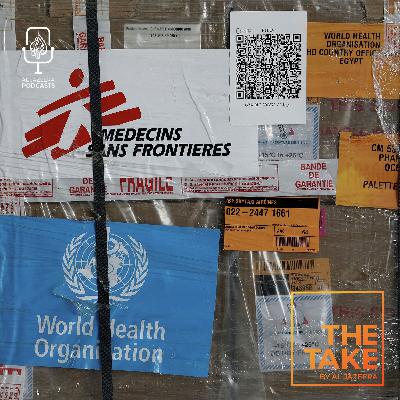

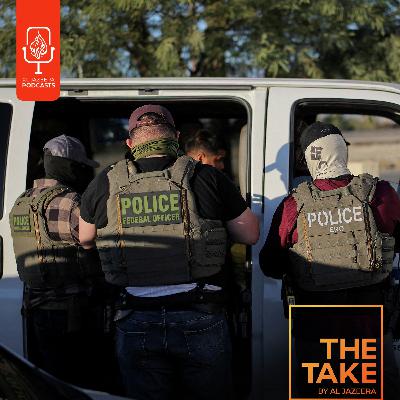
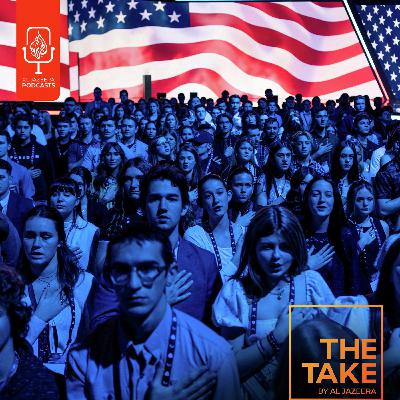



Note the names of the so called journalists! The Koran, the Book of the Dead, specifically authorised adherents of the paedophile Mohammed to lie and deceive the non believers of his perverted cult. Lets have the full names,dates of birth and death of each one, place and cause included. You claim to have the numbers, you inbred goat lovers!
full you Narges you just lie and talk about economy. we are looking for freedom, delegation. we are looking for a secular government. we are looking to put molas to garbage
Yeah it's true that these AI can't make us really focus on something within just 20 seconds.
If you've lived under an actual rock, this episode might be informative.
if you actually read these comments... a recent report claimed that 1200 of the people who were held at alligator Alcatraz are missing- that is almost two thirds of the people who were there. missing with no trace of where they may be... I would love to hear an investigation
5 star review. Listening from Vancouver Island, Canada
yes! Hamas crime against Humanity!!!!! this never needed to happen!
By "people" they mean men. They are not rescuing women who are trapped in the rubble because they won't touch women who don't belong to them.
They've been an utter disaster for Australia. we hate the barbarians. They're criminal savages who, every be day, bite the hand that feeds them. They don't belong in civilised society. They will NEVER fit in with their parasitic, barbarous behaviour, the murderous, thieving beasts. Fuck off.
all garbage!! only starvation to be desperately focused on is Sudan and Yemen! please stick your antisemitism where the sun don't shine!! your hatred blinds you to real awful starvation!! 50 million meals have been sent into Gaza! how many to Sudan!!!
"Trump is trying to keep Israel on track for the ceasefire" That statement didn't age very well, now, did it? 😅😔
the struggle is real
yes. yes we can! he will bring peace to America and work for America FIRST!
oh so, South Korea wasn't the second largest foreign contributor to the Vietnam War?
"-How did Iran intercept the Israel missiles? - Poorly " Are you kidding me guys? didn't you watch the videos of Iran missiles that destroyed Israel missiles?
Really? A whole episode on how Apartheid was beaten without a mention of the Little man from Baie-Comeau?
This was a disappointing episode of a podcast I generally enjoy. The White House reporter for Al Jazeera, although chagrined, amplified the acceptance of Trump’s message and accepted his abuse of the justice system. "They can do this to anyone" lacks the context that it must be done "to anyone" who commits a crime. Why is that not stated here? Is it customary to refer to a former president as "the president" as though he is still in office? Her reporting verges on Trump propaganda.
A retail giant, Horizon Care Services holds a significant position in the American marketplace. Renowned for its extensive network, Horizon Care Services operates across more than 34 states in the United States, encompassing a diverse range of retail offerings. For more information click here. Horizon Care Services
tf is this pro Galvez piece. she was the daughter of a very rich man and lied about her past. she is not pro-abortion and is very right wing and wants to cut social program.
I cannot understand how this is real life. Such a tragedy unfolding while the entire world watches.